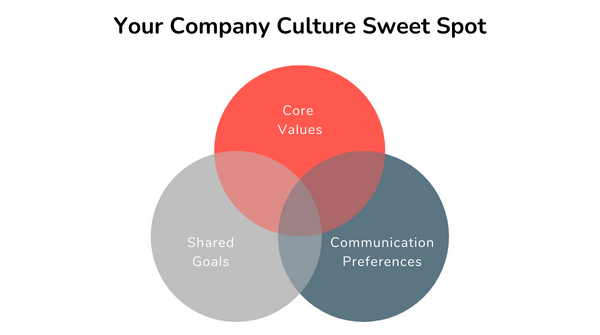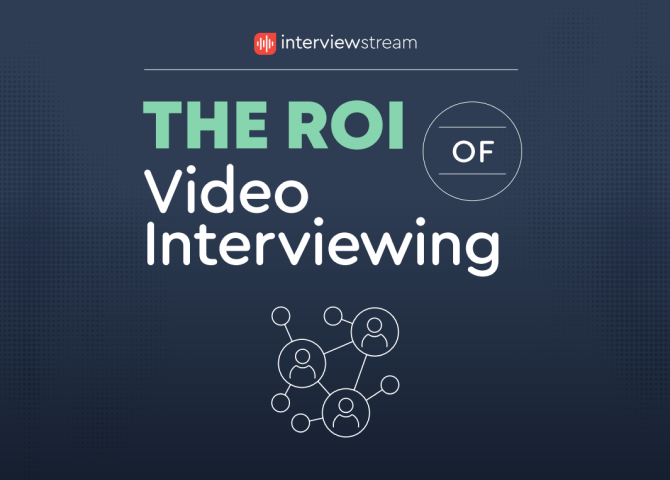The Best Company Culture: What Makes A Company A Great Place To Work?

Culture matters.
Especially lately, amidst the Great Resignation—but it’s true. Workers who feel connected to their employer are 75 times more likely to be engaged and put in their best effort than those who don’t.
Your company’s culture is the line between involuntary turnover and long-term employee stability. But – how do you define the elements of organizational culture? We’ll start with a broad definition and suss out how you can improve your company culture.
Interested in our HR newsletter? Sign up below!
Sign up for our newsletter – we send out a newsletter email two to four times a year which includes HR trends, industry-relevant knowledge, and the latest interviewing tips for recruiters and candidates.
Company Culture: A Definition
The definition of company culture is the
shared attitudes, behaviors, and values
that an organization establishes across its team.
For example, here at interviewstream, our cultural values are accountability, transparency, passion, and curiosity (among others). A solid culture will shine through at all levels of a business, from interns to executives, and will provide guiding principles to employees at every level.
The goals of fostering a consistent culture include helping everyone feel like a team, defining expectations for performance and collaboration, and inspiring employees to work together toward achieving a shared mission.
In other words, your company’s culture is a framework for the way your team members interact with one another, represent themselves at work, and represent your company in the field.
Business Cultures That Work
Organizations that are intentional about defining their company’s culture often point to a few key components. These include core values, shared goals, and preferred approaches to communication.

Additionally, these teams benefit from recognizing the way their culture is implemented and reinforced on a day-to-day basis: by modeling at the leadership level, and encouraging a sense of trust among employees.
Let’s dig a little deeper into what all of that means in practice.
#1: Shared Core Values
Core values are the bones of your company’s culture. They are the principles you embed into your smallest daily operations, your loftiest goals, and every interaction that takes place between employees and their peers or customers.
In practice, these core values should make their way into your approach to branding, engineering, sales, customer service, employee development, recruiting—and anything and everything you do in between.
Culture-conscious companies build these values into their employee handbooks, performance reviews, interviews, and more. Your values should be made visible in every nook and cranny of your business. If they are hard to spot in anything you’re doing, you probably shouldn’t be doing it.
#2: Common Goals
Companies with good company culture clearly define their mission (overall business objectives and general approach to reaching them) and vision (ideal future state). They use these as guideposts when setting time-sensitive goals. This ensures company culture can permeate operational principles. It’s also a surefire way to generate buy-in on your goals among employees.
Day to day, keeping big-picture goals in mind during exercises like departmental prioritization and professional development planning will help foster a culture where everyone is working toward the same key achievements—and knows just how they can contribute to the cause.
#3: Consistent Communication Styles
An important part of company cultures that stand the test of time is having clear expectations on the ways in which employees communicate with one another. A good culture strikes a balance between welcoming individuals of many different learning and communication styles, while establishing a shared understanding of what’s required to help team members interact effectively.
For example, if transparency and timeliness are important values for your company, a good example of company culture might be to acknowledge receipt of emails even if a request can’t immediately be fulfilled. Likewise, leadership might be required to schedule weekly check-ins with employees to keep those lines of communication open with faithful regularity.
#4: Genuine Leadership and Recognition
Speaking of leaders, companies with the best company culture always know that leaders have to be held accountable for putting that culture into action. By setting an example with their own behavior, they’ll set the cultural tone overall. Managers and executives alike should embody the company’s core values at all times, and remind their teams to do the same.
This should, more often than not, take the place of positive recognition and reinforcement. Whether it’s in individual reviews or company all-hands meetings, leaders should celebrate employees who do an exceptional job of putting the organization’s core values into practice.
#5: A Sense of Trust
When all of these factors are in place to help establish a recognizable culture in the workplace—and when, most importantly, they are put into practice consistently over long periods of time—a sense of trust is established across the organization. Employees learn that they can rely on each other and their leaders to adhere to cultural standards and shared expectations.
This trust takes a lot of the uncertainty out of interactions between colleagues. For instance, consider how it might feel for a greener employee to prepare for a presentation in front of several high-level leaders she doesn’t work with often. Without a consistent culture of respect and autonomy to lean on, that employee might spend an inordinate amount of time fearing backlash or hyper-criticism from her listeners—and the anxiety will certainly affect her performance. But if she’s learned she can trust this group to hear her out and welcome a fresh perspective, she’s got a lot more mental space to do her best work.
Why Does Work Culture Matter?
While business leaders would be fooling themselves to think their employees consider each other like family, the fact is that the workplace is an important community for today’s adults. We spend a significant portion of our waking hours with our colleagues, and even when our connections with these folks are virtual, their constancy in our routine can have an impact on how we feel at the end of each work day.
It should come as no surprise, then, that culture has been proven to correlate with performance, turnover, and agility. Your employees can work better, feel better, and stick around for longer if they feel engaged and welcome at work, and come to trust their teams to treat them with respect. And a happier, more engaged workforce makes for a more successful and adaptable business.
How to Identify Authentic Core Values At Your Company
As you’ve probably gathered by now, documenting your company’s core values is really the first step toward establishing the overall culture of your organization. To do this, you’ll want a mix of perspectives from many different employees. After all, your core values should reflect the team as a whole—and that means gathering input from every level.
That being said, as the ultimate coaches of your culture and the people with the most in-depth perspectives on the priorities of your business, it’s important for your leadership team to take initiative in defining your values. It’s critical for your leaders to understand what matters to their employees and your customers and ensure both of these needs are reflected in your company’s culture.
This process of establishing your values should be thoughtful and it should take time. (Make sure you name a project champion or small committee to own this process and keep things on track.) To start, have department heads schedule time or send out surveys and invite employees to provide honest answers to introspective questions like:
- What do you enjoy the most about working here? What do you like the least?
- How do you prefer to communicate with your colleagues on a daily basis?
- What’s the best feedback on our company or products you’ve ever received from a customer?
- In what order of importance would you rank the following organizational goals: profitability, agility, product excellence, flexibility, and friendliness?
- Which of our competitors do you admire and why?
- Tell us about a company you trust. What makes them trustworthy?
- Which three adjectives describe the ideal workplace for you? Which three adjectives describe our current workplace?
Next, review the input you receive at the leadership level. Face up to where you can improve as an organization, and celebrate what you’re doing well. Compare these lessons to your overall business goals and identify which overlaps are the most important.
Once your leadership team agrees on some key themes, have your champion or committee draft a list of values to kick things off. Invite leaders’ and employees’ feedback again, and finetune as needed.
Finally, make sure your values resonate with your customers. Choose some established, loyal customers who know you well to give their input—and ask for feedback from new ones, too, to round things out.
Remember that these core values should last a long time (preferably forever!). Don’t rush the process.
Putting Culture into Action
Deducing and defining your values is a big undertaking, to be sure. But all that brainstorming, interviewing, drafting, revising, and documenting is for naught if you don’t put the words into action.
Employee handbooks and codes of conduct certainly help set the tone for new employees and establish compliance expectations. However, culture is more about practice than theory—so it should be made visible on each of your teams, every day.
At the start of your culture journey, encourage leaders to take your list of core values and back them up with actionable ways their teams can put them into practice. For example, if transparency is an important theme for your organization, leaders should commit to fessing up to their own mistakes. Working even the simplest “I apologize for letting this message get pushed to the bottom of my inbox!” into interactions from executives to employees can set a remarkable example for honesty and charity.
Similarly, if your values lay out a spirit of celebration between team members, make sure leaders of all levels are attributing their team’s work to the individuals who contributed. So often an executive presents their department’s results to other executives, and not one of them knows who actually executed on the project before that deliverable ended up in the boardroom. When team leads, directors, and executives can say, “our recruiting associate, Ben, did a ton of deep research to pull together this data for us,” a culture of honest recognition can easily take root.
Hiring with Team Culture Values Top of Mind
Aligning your hiring practices to cultural expectations helps ensure standards are more consistently met, and gives hiring managers a better grasp of which candidates might stick around for the long term.
To be clear, though, a “good culture fit” is not defined by the hobbies a candidate has in common with a hiring manager or a peer’s desire to hang out with an interviewee. Rather, hiring for culture is about identifying candidates who conduct themselves according to your company’s values—even if they do so in unexpected ways.
During your interviews, ask questions for company culture fit that get to the heart of what’s important to each candidate and how they do their best work. What excites them about their area of expertise? How do they prefer to communicate with their manager? What motivates them? A candidate’s answers might be quite different from their interviewer’s, but still reveal that they align with your overall values as a company.
Say one of your core values is teamwork. In service of this goal, your team gathers for a brainstorming meeting to kick off every creative project, because talking through some wacky suggestions helps you get to the innovative idea that will make for a great end result.
Some of your teammates come to this meeting totally fresh, thinking up all of their suggestions on the spot, because they feel more energized that way. Others like to write ideas down in advance, because inventing them from scratch is easier in quiet than in a noisy room. Neither of these approaches is wrong, and accommodating both can yield more imaginative and productive conversations. What’s important is that everyone’s excited about the process.
Evaluate job candidates with that kind of flexibility in mind.
Company Culture Interview Questions
- What was your favorite part of your last job? Your least favorite part?
- How do you like to receive feedback?
- What is your communication style?
- Who did you get along with the best in your previous role? The worst? How did you resolve differences with them?
- What do you value in a manager/company?
- Why do you think you would fit in well here?
Embracing the Quirks of Your Culture
Above all, you should strive to establish and maintain a company culture that is authentic, unique, and lasting. Employees want to know they are an important part of something bigger than themselves, be genuine at work, and have fun with their colleagues.
Get the culture right, and you’re more likely to retain talent, attract referrals, and succeed in achieving your company’s mission. So get started!
Want to learn more about video interviewing & scheduling?
Chat with a client success expert today and learn how to leverage remote interviewing solutions to show off the company culture at your organization.
About interviewstream
interviewstream is an industry leading recruiting software company that helps you reach your top candidates more effectively. Our customers have completed over 3 million interviews using interview builder, interview on demand, interview scheduler, interview connect, and interview prep and we’d love to help you as well. Talk to an expert today to learn how to get started.
The interviewstream platform
Speak to an expert today to learn how our remote interviewing solutions make hiring more effective.
About interviewstream
As companies transition to remote work, we exists to help recruiters and hiring teams ask the right questions every time, screen candidates faster, make scheduling easier and reach candidates everywhere. Using our remote interviewing platform, your team will have a complete view of the candidate in one location while also leveraging one of the leading platforms for online interviewing.
Table of contents
- Company Culture: A Definition
- Business Cultures That Work
- Why Does Work Culture Matter?
- How to Identify Authentic Core Values At Your Company
- Putting Culture into Action
- Hiring with Team Culture Values Top of Mind
- Company Culture Interview Questions
- Embracing the Quirks of Your Culture
- About interviewstream



